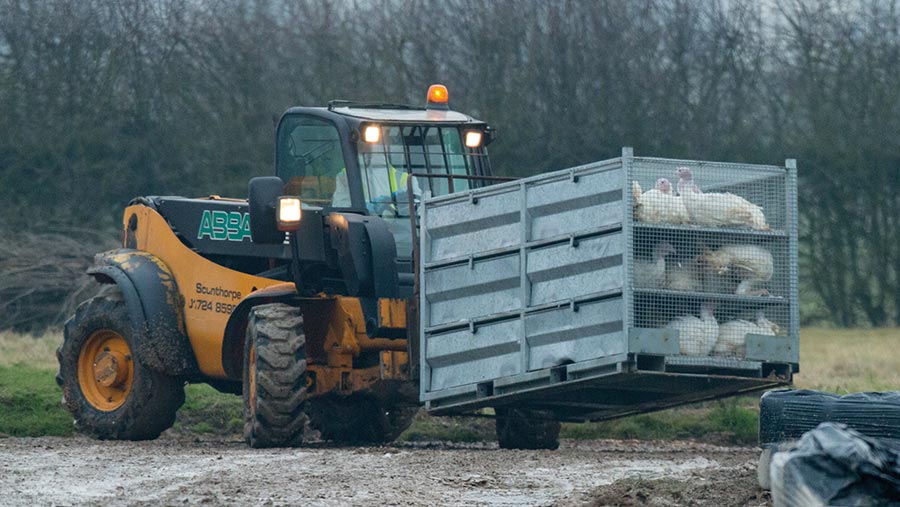Q&A: Guidance on avian flu with England’s chief vet
 © Tim Scrivener
© Tim Scrivener As winter approaches migratory birds fly in, bringing the risk of avian flu in the UK.
We ask the UK’s chief veterinary officer, Christine Middlemiss, about the disease and how risks can be kept to a minimum.
See also: Avian influenza prevention tips and how to handle an outbreak
What is Avian flu?
Avian flu is a virus which normally affects birds.
There are two types of avian flu, with the highly pathogenic strains being the more serious type. They can often be fatal in birds.
Why is it important?
Last month, I declared the UK was free of avian flu, but, over the past year, 26 outbreaks were confirmed on poultry farms, in backyards and in premises with captive birds.
These outbreaks have serious implications for the farmer and those in the surrounding area, with movement and trade restrictions put in place.
This is why it’s vital farmers take action now to plan for outbreaks, tighten biosecurity and prepare for this year’s bird flu season.
What are the symptoms?
In the highly pathogenic strain of avian flu, the common signs include a swollen head, loss of appetite, fewer eggs laid and increased mortality.
The low pathogenic strain causes mild breathing problems or a reduced feed intake or depressed egg production.
What should a farm do if symptoms appear?
Avian flu is a notifiable animal disease and failing to notify the authorities is an offence.
If you suspect any type of flu in your poultry birds, you must report it immediately to the Defra Rural Services helpline on 03000 200 301.
(If you are in Wales, call 0300 303 8268, in Scotland contact the local Field Services Office, and in Northern Ireland call 0300 200 7840).
How does it spread?
The current risk in England remains low, but this will change as winter approaches and migratory wild birds fly in and mix with native populations.
The disease typically spreads through infected bird movements via bird-to-bird contact and indirectly with contaminated fluids, faeces, vehicles, clothing, feed or bedding. Wild birds are a cause of many outbreaks in kept flocks.
Why does it recur annually?
Vaccination of birds for avian influenza is not permitted and like many viruses, avian flu has many types, circulating in wild birds and poultry in other countries.
Each year, migratory birds arrive, bringing avian flu with them.
We are well equipped to eradicate outbreaks of avian flu in our poultry and captive birds, but cannot do this in wild birds.
When do risks start to rise in the UK?
The risk normally starts to rise as the winter months approach. Wild birds mix with native birds, meaning the infection risks increase rapidly.
How will poultrykeepers know when the risk rises?
We monitor avian flu globally to ensure farmers are prepared for outbreaks. Our free disease alerts through text and email warn of local disease outbreaks.
Which farms are at the greatest risk of contracting and spreading the disease and why?
Farms with poor biosecurity including those with unmaintained sheds, poorly trained staff, vermin or uncovered bedding.
What can farms do to limit the risk?
Steps to cut risks include drawing up contingency plans for dealing with disease, housing measures and nearby outbreaks, regular staff training and shed maintenance checks, and signing up for disease alerts.
Further steps are set out on the government website.
What triggers a housing measure for free-range flocks?
All available options for reducing the impact of outbreaks are considered.
If a large number of wild birds are positive for avian flu and there are several outbreaks on farms, it is likely the housing measure will be introduced as part of a prevention zone.
How long do they last?
Housing measures usually remain in place until migratory birds begin to leave the UK in the spring, but will stay in force until the disease risk to poultry has fallen to a low level.
What happens if there is an outbreak on the farm or in a neighbouring flock?
When we are notified of possible disease, our first action is to place restrictions on the farm concerned until sampling and official testing takes place.
If testing returns positive results, I confirm disease and order disease control zones to be put in place and the birds involved will be humanely culled.
Farms in the protection zone will be visited by the Animal and Plant Health Agency or their local authority to check on their animals and provide support to farmers with the latest guidance.
Is compensation paid to farms that are culled out?
Yes, if healthy birds on the infected premises are culled to control the spread of disease.
What are the best sources of information, updates and alerts?
Farms with more than 50 birds, must sign up to the GB poultry register. Farms with fewer than 50 birds can register voluntarily: Poultry registration rules and forms
Registering means you will receive free text or email disease alerts if there is an outbreak in Great Britain.
You will also receive texts or email alerts if you fall within a disease protection or surveillance zone. These are 3km and 10km zones around the infected premises where additional biosecurity is needed.
